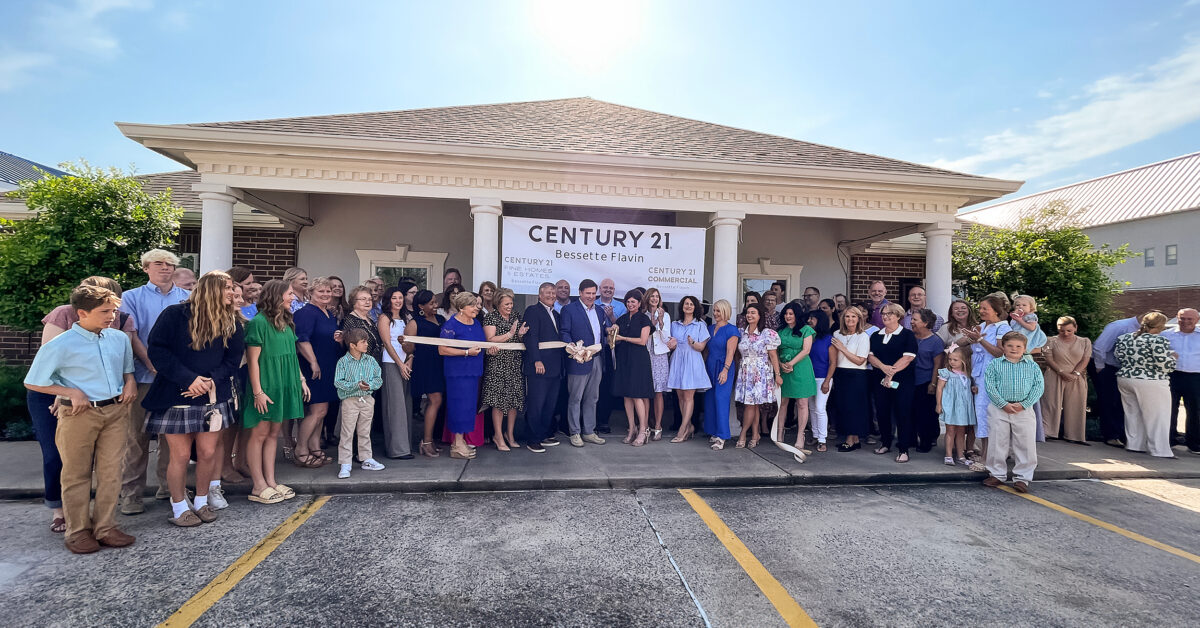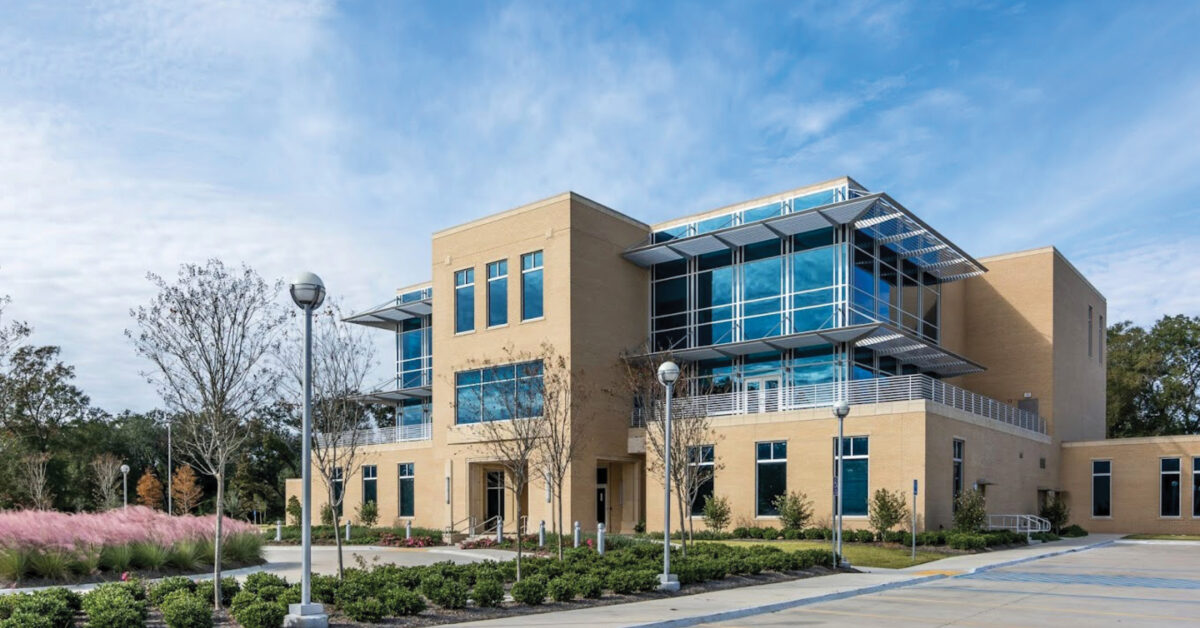
The Bookshelf
July 2024
EDUCATION SUPERHEROES
July 2024While national and international banks get a lot of attention, more people are flocking to local banks conveniently placed within their communities. A 2024 report by the Wall Street Journal acknowledged that customers are moving their funds to local banks to get better rates and engage with bank staff. As the banking industry continues to become more digitized, customers want the assurance that they can go to their local bank, discuss problems and opportunities, and make sure they are getting top notch service. After all, where clients decide to store their money is an important decision. Local banks strive to earn their clients’ trust and focus heavily on customer service to set them apart from larger institutions . . . and the approach is working!
b1Bank Opens New Branch
by Kerry Andersen
In a modern age when technology is transforming the banking and customer service experience, Baton Rouge based b1BANK is doubling down on its community presence and relationship-driven approach in Lake Charles. A new larger branch was recently unveiled at 825 Ryan Street, just a short distance from the bank’s previous storm battered building. The new showpiece banking center includes additional parking, a drive-thru, and an interactive teller machine (ITM) which provides customers with access to a live teller before and after normal business hours. ITMs use a combination of touch screens and video technology to offer a virtual version of the in-person banking experience with additional transaction capability.
b1BANK has been part of the Lake Charles community since 2009 and says it is committed to fostering economic development in the city, and especially the downtown corridor.
“We have experienced significant growth in the Lake Charles market and required a larger facility to better serve our current clients’ needs and the community,” said b1BANK market president Jeffrey Davis. He adds, “As we continue to grow, it is important that we remain active in efforts to rebuild and revitalize downtown Lake Charles.”
The new building design reflects some of the compelling historic architecture already present in the downtown area while incorporating modern building technology to help prevent damage from future storms. The larger branch and recommitment to the Lake Charles market comes at a time of incredible growth for b1BANK – it’s almost quintupled its asset size over five years. Davis says leadership across the board is intentional about making sure the rapid expansion doesn’t negatively impact its culture by remaining laser focused on five guiding principles: relationship driven teamwork, thoughtful and disciplined decision making, meaningful communication, doing the right thing the right way, and striving to be the best through continual improvement.
“We have thrived in recent years with this focus on local decision making, investing in the community through hands-on volunteerism and the development of entrepreneurs, and offering innovative technology to meet the specific needs of our customers,” says Davis. “It’s our belief that banking should be uncomplicated.”
Community involvement is not just a catch phrase at b1BANK. Employees are given paid time off during the workday to help area nonprofits by volunteering for causes they value. The b1FOUNDATION was launched to support this community engagement on a larger scale. It also supports financial literacy and education outreach programs.
b1BANK was established in 2006 as a community bank to support entrepreneurs and small community businesses with uncomplicated products and services. The company has seen tremendous growth and now has nearly eight hundred employees and operations across Louisiana, Texas, and Mississippi. In April, the company announced an agreement to acquire Oakwood Bank in Texas, adding a total of six full-service banking centers in Dallas, Oakwood, and Snyder to its portfolio. The purchase will increase b1BANK’s total assets to approximately $7.4 billion and deepen its customer base in one of America’s strongest markets.
The newly opened b1BANK branch is located at 825 Ryan Street in Lake Charles. Operating hours are Monday through Friday from 9 a.m. to 5 p.m. More information at b1BANK.com
Banking on a Legacy of Community Service
First Federal Bank of Louisiana Celebrates 75 Years of Service to the SWLA Community
by Katelynn Mouton
In 1949, First Federal Bank of Louisiana opened its doors with a purpose of empowering people and places to realize their potential. Today, it continues to work towards a mission of empowering individuals and businesses to realize their dreams and attain their goals with meaningful financial products and services.
“Seventy-five years ago, community leaders in Lake Charles came together with a vision for a savings and loan institution that would galvanize the regional economy and invest money locally,” says Erica McCreedy, First Federal Bank of Louisiana Marketing Manager.
First Federal Bank of Louisiana is a billion bank, headquartered in Lake Charles. “We haven’t been bought and haven’t merged with a larger bank, and that’s rare these days,” says McCreedy.
In a generation of mergers and acquisitions, the opportunity to bank with a locally owned and operated financial institution remains important to the health of a local economy.
“Local community banks are vital because they understand the needs of the community,” explains McCreedy. “First Federal Bank of Louisiana is a mutual bank, which means we’re chartered to benefit the local community. Our money is invested locally; we sponsor your kid’s softball team, we fund affordable homeownership programs, and we donate to programs that help women, minorities, veterans, and those experiencing homelessness.”
Adapting and evolving as the world changes is vital in any industry, but when it comes to banking, it is personal. It is about each individual family’s bottom line. Looking to their customers for what is the next desirable product or offering is something McCreedy says has guided First Federal Bank of Louisiana through the decades. “We remain proactive in ensuring we are meeting the needs of all customers, and many of our employees are customers, so they have a great understanding of what the community needs.”
In some cases, they have found success by sticking to their roots. “We stay strong after 75 years by ignoring the fickle trends in banking and staying true to our core values,” adds McCreedy.
In celebration of the bank’s 75th anniversary, they have recently introduced a new product offering. “We recently rolled out our new Kasasa Cash and Kasasa Cash Back checking accounts, which can give you high interest or cash back each month,” says McCreedy. “These accounts are great for younger customers who want more out of their checking account.”
McCreedy says a revamp of some of their digital banking offerings is also in the works, providing customers with the type of digital banking experience they typically seek from larger banks.
For more information on First Federal Bank of Louisiana, visit www.ffbla.bank.
LAKESIDE BANK
Finance 101: Advice for Freshmen and Their Parents
by Kristy Como Armand
When teenagers leave the nest to embark on the next phase of their lives at college, parents often spend time worrying about the decisions they’ll make away from their watchful eyes. Will they study enough? Make new friends? Use good judgment when facing peer pressure? Find the right career path?
Meanwhile, a handful of other important questions often go unasked and unanswered: Do they know how to manage their money? What will they do with all the credit card offers headed their way? Will they end up with a heavy load of debt?
College freshmen, who have yet to accumulate debt and are often in need of extra funds, are a prime target for credit card offers. “Credit cards are enticing for anyone, but especially for college students because they are in a vulnerable position. They have limited access to funds, but plenty of wants and needs,” says Aaron LeBoeuf, senior vice president with Lakeside Bank. “That credit card offer will be very appealing as they want to spend more than they have.”
Although credit cards get a bad rap, they are not inherently bad, says LeBoeuf. The key to mastering credit cards is to use them only when needed, pay as much on them as possible every month (ideally the entire balance), pay on time and never max them out. “It’s easy for college students to overlook the fine print that contains the enormously high interest rates when you are focused on a low monthly payment,” says LeBoeuf. “Many students may not realize they can get a credit card with a lower rate from a local bank, in most cases. These are the kind of conversations parents need to have with their teens before they enter college.”
Lakeside Bank offers student checking, debit card and credit card options for just this reason. “Our accounts offer a range of benefits to make gaining financial skills easy and affordable for students,” explains LeBoeuf. “These accounts can be set up with parental access so parents can monitor activity and guide their teen as they navigate money management during the college years.”
LeBoeuf offers some additional financial guidelines parents should consider discussing with their college freshmen:
· Financial decisions they make today could affect them for years to come. A balance of $1,500 on a credit card could theoretically take years to pay off if it’s not managed properly.
· Explain how to read and understand credit card offers.
· How to create a budget and stick to it – this may mean doing without things they want.
· Never use a credit card for daily needs, like groceries or textbooks. Credit cards should be limited to emergency use only as students gain money management skills.
· Never use a credit card as a source of cash. Many cards offer cash withdrawals on your line of credit, but fees are usually much higher for these amounts. This also reinforces the bad habit of living beyond their budget.
· Encourage them to build a rainy-day fund for emergencies, if possible.
· Choose the right bank. Banks have varying offers for students.
· When in a bind, avoid the lure of quick cash, payday loan offers.
· Ways to save money, such as coupons, generic brands, used textbooks, thrift shops, and so on.
“Remember,” stresses LeBoeuf, “the college years are a time of transition to adulthood. Of course, you want to help them as much as you can while they get their education, but don’t take care of everything for them. You won’t be doing them any favors if you shield them from making some tough financial decisions. One of the most important lessons parents can help their college student learn during this time is how to manage their money responsibly.”
Learn more about Lakeside’s student accounts at www.mylksb.bank.
Merchants & Farmers Bank
Understanding the Importance of Human Interaction
by Madelaine Brauner Landry
Remember the days of manually balancing a checking account? Armed with paper, pen, and maybe an adding machine, you’d start with the balance, add all deposits, and subtract all withdrawals or purchases. Missing just one transaction would throw off the entire exercise.
Today’s consumers enjoy mobile banking apps, online portals, and self-service options that have quickly become the norm. Digital technology brought significant changes to the banking and financial industry. Who doesn’t enjoy the convenience and real-time access to their accounts? Still, it is nice to know that there are human beings employed as tellers, loan officers, and financial advisers at your local bank.
“Having a banker you can speak to, face-to-face or on the phone, makes a huge difference,” says Ken Hughes, President/CEO of Merchants & Farmers Bank. “We still see that as part of our role as a community bank here in Calcasieu Parish. We face unique challenges here from the impact of weather to economic issues. Our customers want to be able to pick up the phone and get an answer from people they trust.”
To stay competitive, banks must leverage the power of innovative technologies to enhance customer experiences, optimize operations, and drive growth. However, a community banker also understands the interactive nature of banking is one way to create customer loyalty. Furthermore, like digital, the Age of AI is upon us. This will also have a transformative impact on the industry, affecting roles in virtually every part of the bank. Consumers are still more likely to respond to a human voice, to people they know . . . something community bankers understand. While acknowledging that banking technology has simplified people’s lives, Hughes recognizes just how important that human factor can be. “We work to maintain our human contact. Our customers know that it’s important to keep your money with the folks you want to borrow from. It streamlines things.”
“We recently introduced interactive teller machines that allow you to speak to a live teller and the response has been great,” says Hughes. “It lets us expand our hours of operation and people like having some human interaction. There’s something reassuring about that.”
Savvy consumers have become accustomed to researching financial issues from shopping interest rates to updating one’s credit score. Financial knowledge at our fingertips is one step in the realization of one’s goals like purchasing homes, automobiles, and making wise investments. Armed with that knowledge and being able to discuss these things with someone trustworthy, someone familiar, is a commodity few consumers want to forfeit.
“I think our loan officers enjoy what they do because they’re a significant part of helping people fulfill their dreams. Whether it’s finally being able to do that business expansion you’ve been working toward, or getting approved for a home renovation, working with bankers who are right here makes a big difference.”
With the increasing digitization of banking services, cybersecurity and fraud prevention have also become critical priorities. Banks are investing in technologies that safeguard customer data and protect against evolving threats, both essential elements of banking with someone you trust. In a world that is constantly changing, having a familiar bank that has been around for nearly a century, right in your own community, is often an overlooked asset. It is not one that Hughes and his staff take for granted.
“In recent years, bank mergers and acquisitions seem to be happening every time you turn around. But Merchants & Farmers Bank is still locally owned and focused on local customers. That’s been our approach since 1928. It’s the professionalism of our team that allows us to provide superior service and maintain our independence. We’re very proud of that. We like to say, ‘If you’re bad with names, don’t worry; ours won’t change.’”






